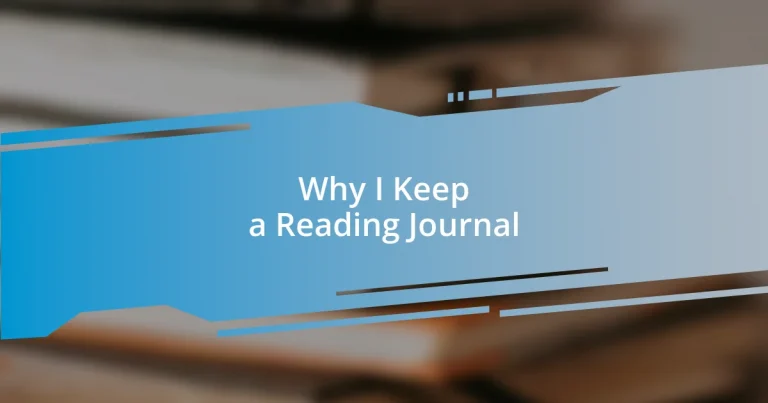Key takeaways:
- Write without judgment and establish a daily journaling routine to enhance personal reflection and clarity.
- Explore character motivations and themes in books to deepen understanding and self-awareness while journaling.
- Set personal reading challenges to diversify reading experiences and engage with different literary perspectives and genres.
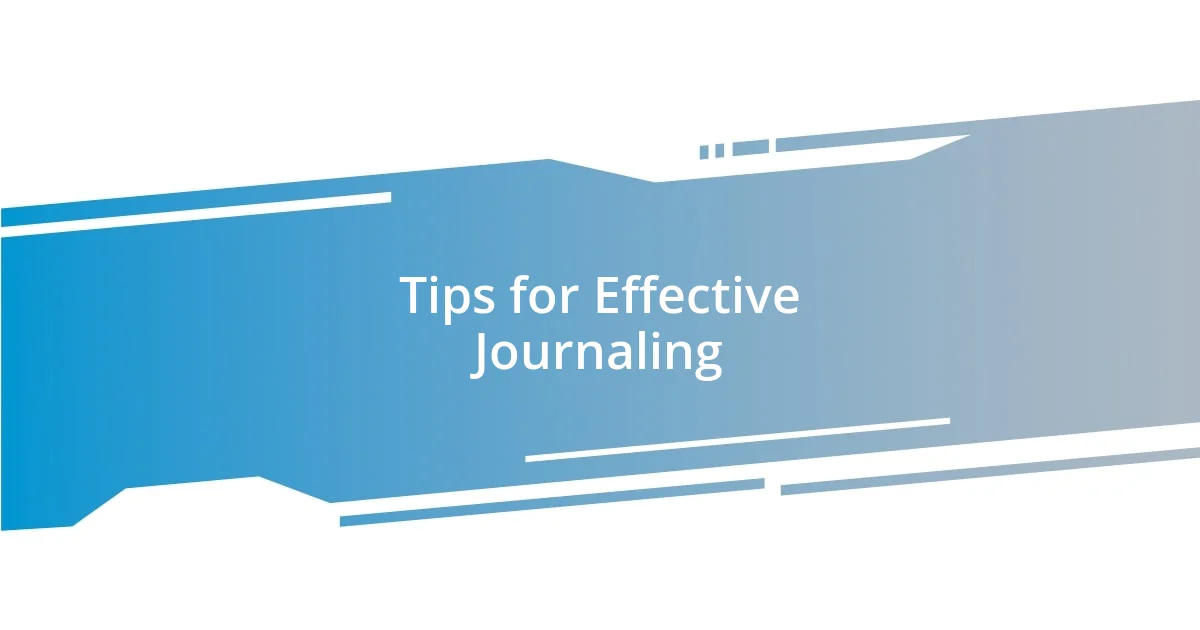
Tips for Effective Journaling
One of the best tips for effective journaling is to write without judgment. I remember the first time I flipped open my reading journal, my inner critic was loud and clear. It took some practice to silence that voice and just let my thoughts flow freely. Have you ever felt that pressure to write perfectly? Allow yourself to express your genuine reactions to what you’ve read, even if it feels messy at first.
Another effective strategy is to make journaling a daily habit. I discovered that setting aside just ten minutes every evening transformed my insights into powerful reflections. Setting a specific time helps create a routine, almost like creating an appointment for yourself. Can you remember the last time you felt truly connected to your thoughts? I can assure you, regular journaling will deepen that connection and bring clarity to your understanding.
Don’t shy away from using quotes or passages when they resonate with you. I often find myself jotting down a line that sparks a lightbulb moment. Adding these gems to my entries helps me anchor my thoughts and feelings, making journal entries richer and more meaningful. Have you ever highlighted a phrase in a book that made you pause? Take those moments and turn them into conversation starters with yourself on the pages of your journal.

Ideas for Journal Entries
One idea for journal entries is to create character sketches. When I immerse myself in a novel, I often find that certain characters linger in my thoughts. I take time to explore their motivations, flaws, and how they reflect parts of myself. This practice not only deepens my understanding of the story but also reveals insights about my own personality. Have you ever considered how a fictional character might mirror your experiences?
Another option is to write reflections after finishing a book. I usually jot down my immediate feelings—did the story satisfy me or leave me wanting? I’ve found that capturing my raw emotions right after reading helps me process the narrative. It’s like preserving a snapshot of my thoughts at that moment in time. When was the last time a book made you feel deeply?
Lastly, I like to list themes and motifs that resonate with me. This exercise allows me to connect seemingly unrelated stories through common threads. For example, I once realized that several books I enjoyed shared themes of loss and redemption. Thinking critically about these themes not only enhances my literary experience but also connects me to others who have had similar thoughts. What thematic connections have you discovered through your reading?
| Entry Idea | Description |
|---|---|
| Character Sketches | Explore character motivations and flaws, reflecting on how they relate to your own life. |
| Book Reflections | Jot down immediate feelings upon finishing a book, capturing the essence of your experience. |
| Thematic Connections | Identify and connect themes across different books for deeper literary insights. |
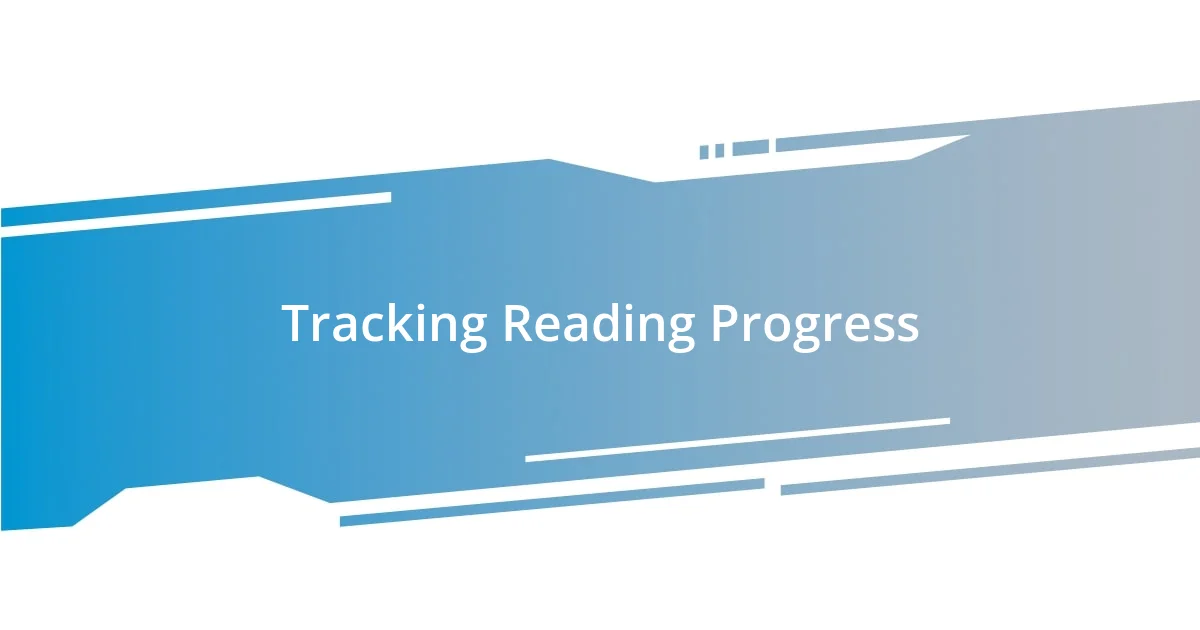
Tracking Reading Progress
Tracking my reading progress has been a game-changer for my literary journey. One day, while flipping through my previous entries, I stumbled upon a timeline of my reading habits. That visual representation of what I’d accomplished truly sparked a sense of achievement in me. It’s gratifying to see how many books I’ve tackled over the months, and thinking back to the emotions I felt while reading each one brings those moments alive anew.
As I gauge my progress, I often utilize a few simple strategies:
-
Set Reading Goals: I like to challenge myself with a target number of books each month. It gives me something to aim for.
-
Monthly Recaps: Each month, I summarize what I read and how it affected me. Those reflections help identify patterns in my interests.
-
Track Pages Read: I note how many pages I’ve read in a session. It’s fascinating to see how my focus improves over time.
-
Highlight Quotes: Keeping track of powerful quotes has transformed my understanding of the themes in the books.
-
Reflect on Growth: Occasionally, I compare my entries from last year to see how my perspective has evolved. This practice often reveals surprising shifts in my tastes and preferences.
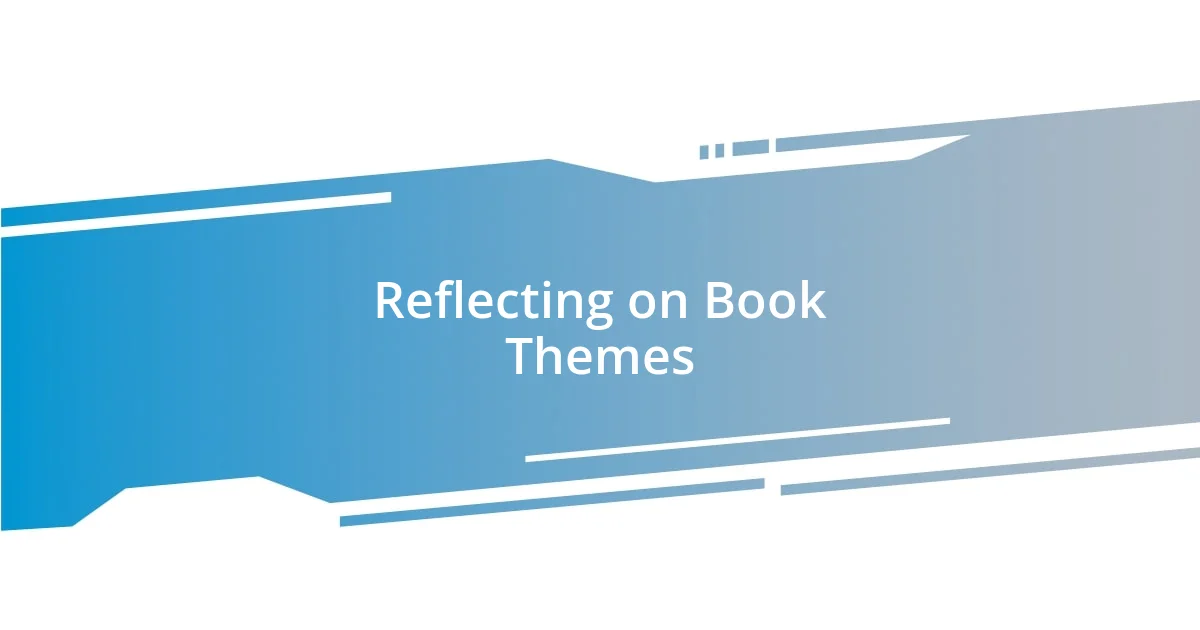
Reflecting on Book Themes
Reflecting on themes can transform how I perceive a book, offering layers of meaning I might have missed during my first read. For instance, I once finished a novel centered on identity and belonging, and I found myself pondering the significance of cultural heritage in my own life. Have you ever thought about how a story’s theme resonates with your personal journey? I believe such reflections deepen our connections to literature and ourselves.
I often jot down notes about recurring themes in my journal, like love, betrayal, or the quest for self-discovery. When I revisit these entries, I’m struck by how literature articulates feelings I’ve struggled to express. One memorable moment was recognizing the theme of resilience in a series that spanned generations. It made me reflect on my own challenges and how I navigate them. This thread of resilience became a personal mantra for me. What themes have empowered you through your reading?
I find it fascinating to explore how different books tackle similar themes in unique ways. Last year, I read two novels that approached the concept of redemption, but each told a vastly different story. This exploration encouraged me to consider how redemption plays out in my life and in the lives of those around me. Are there themes you’ve noticed offering fresh perspectives depending on the author’s lens? It’s a rewarding exercise that not only enhances my reading experience but also inspires meaningful conversations with fellow book lovers.
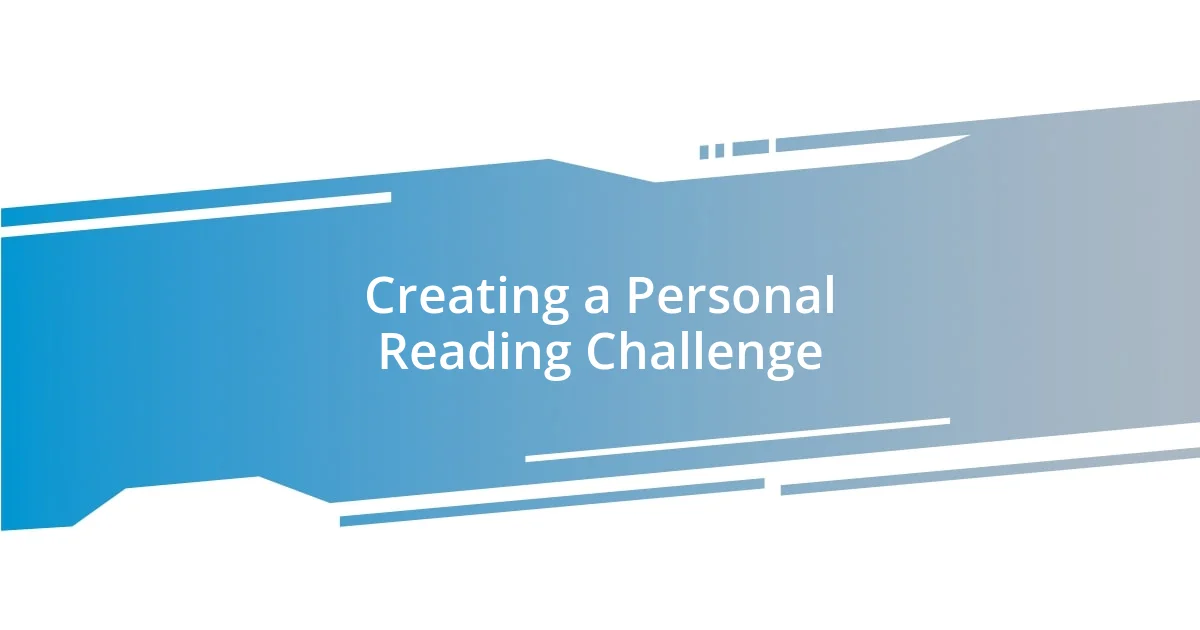
Creating a Personal Reading Challenge
Creating a personal reading challenge has been an incredible way to deepen my love for literature. A few years ago, I set a goal to read at least one book from a different genre every month. This small shift helped me discover authors and styles I never would have explored otherwise. Isn’t it exciting to think about the unexpected gems that await us in unexplored territory?
I often find that setting specific challenges keeps my reading life fresh and invigorating. For instance, last summer, I embarked on a quest to read books with shorter page counts, aiming for quick yet impactful reads. It was an eye-opening experience; I rediscovered the joy in finishing a book and the satisfaction that comes with it. Have you ever felt that rush when you complete a book you were initially unsure about?
Another rewarding aspect of my reading challenge is having a themed month, such as “Books by Black Authors” or “Fantasy Adventures.” This approach not only broadens my literary horizons but also deepens my understanding of diverse perspectives. When I tackled a month of science fiction, I found myself captivated by how speculative narratives reflect societal issues. It sparked meaningful conversations with friends—what themes do you think emerge in different genres that resonate with your life?












